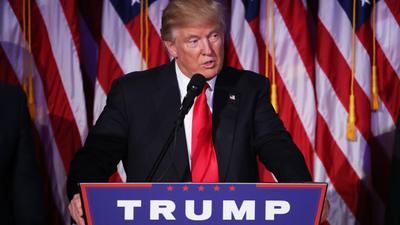Literally overnight, the U.S. role in the process of implementing the Paris agreement has changed.
For people who want to see America engaged in serious global cooperation and a continued decarbonization of the U.S. energy system, the likely chaos of the Trump administration — as it moves from the bombast of campaign yelling and tweeting to the much harder task of running a government — will require new political strategies. Activists and politicians who care about climate issues should alter their thinking to making those new strategies a reality. They need to focus on how to offset the harmful effects of Trump on global diplomacy — something that is possible, to some degree. And they need to gear up for policy action in the states (and defenses of existing policies through the courts). A Trump presidency will cause huge anguish for environmentalists and offer a powerful symbol for raising money and political opposition, but sharp thinking is needed to make sure that opposition is actually effective in protecting the planet.
The most immediate effect of Trump’s rise will be in how the United States works with other countries. Climate change is a global problem: The U.S. accounts for only 16 percent of total annual emissions and thus the only way to affect the global picture is through leadership and cooperation. Paris worked where other efforts, such as the Kyoto Protocol, largely failed because it adopted a more flexible, “bottom up” approach to governance that the U.S. had been advocating for years. This flexible approach made it possible to get more countries engaged and set the stage for a truly global effort to cut emissions.
Literally overnight, the U.S. role in this process has changed. Foreign nations may have overreacted to Trump’s tweet about a Chinese hoax in global warming, but clearly the Trump team is hostile to climate policy, a point confirmed by selecting the Competitive Enterprise Institute’s Myron Ebell (a deep skeptic of climate science and an even starker critic of most environmental policy) as head of the team overseeing the Trump transition at the Environmental Protection Agency. Trump has stated he will “cancel” the Paris agreement, which is not something he himself can actually do. A Trump administration could withdraw from Paris or even from the UN Framework Convention on Climate Change (the parent of the Paris agreement), both processes that can unfold fairly quickly (1-3 years). But unlike earlier administrations — such as George W Bush’s, which abandoned the Kyoto Protocol before the U.S. tried to ratify the agreement, or George H.W. Bush’s, which never submitted the Convention on Biological Diversity for U.S. ratification — the Trump administration will soon find that it is very difficult and diplomatically costly to abandon existing treaty commitments. This is unlikely to be a high priority for a newly elected president who devoted virtually zero attention to climate policy during the campaign. All the drama created by Trump’s statements will be fodder for dramatic UN floor speeches, and some are already being delivered in Marrakech. But by themselves they won’t amount to much real impact on climate diplomacy.
The most harmful impacts of the Trump presidency on climate cooperation will come in two other ways. First is funding. In Paris, nations reconfirmed a pledge to provide $100 billion in new money to help developing countries engage with climate policy, with a large fraction earmarked for the least developed countries that are the most exposed to the harms of unchecked warming. Nobody really knows what counts as new money, but as a sign of good faith, the developed nations put up $10 billion to get started — one-third from the U.S., and one-third from China. America has not yet paid all of its commitment, and it seems clear that Trump will not. For the developing countries, this will be a sign that America is unreliable and that the benefits of staying engaged in climate negotiations are fleeting. While these countries are generally not large greenhouse gas emitters, having their support is essential to making formal decisions — including adoption of the Paris agreement.
The other big harm that Trump will cause almost immediately to the Paris process will come when the U.S. no longer leads in the long, difficult process of putting the accord into effect. The Paris agreement is what’s known as “pledge and review.” Countries make pledges to cut emissions and adopt various policies, and then every few years those efforts are reviewed. Success hinges on review, and until Tuesday it was assumed that the U.S. would help show the world how good review systems actually work. Indeed, the U.S., along with China, had already done that in volunteering itself for peer review of its fossil fuel subsidy reform policies. Without leadership, the review process will probably follow narrow and bureaucratic UN rules, which are the only rules countries can agree upon right now, so formal review will be impotent.
If the U.S. eliminates its leadership role on climate, that leaves China to steer the ship.
The ability to get countries to cut emissions will suffer as the fragile coalition that created Paris splinters and as the process loses its biggest champion for turning the promise of the Paris agreement into a functioning diplomatic machinery. My guess is that this won’t kill the Paris process, but it will severely weaken it.
The most interesting impact of all this may be on China. For the last few years, the U.S. and China played a central role in building the Paris regime through their “G2” bilateral efforts on energy innovation and joint announcements of emission cutting goals and policies. That approach of country-tailored commitments is enshrined in the pledge and review process that helped make Paris a success [As I wrote last December on these pages. ] The Chinese have favored this approach for its flexibility, and while the G2 relationship may quickly die (or go into hibernation) under Trump, China’s commitment to this approach won’t. If the U.S. leaves Paris and eliminates its leadership role, that leaves China to steer the ship.
On the U.S. domestic front, the Trump campaign and its policy websites suggest there will be a big rollback of regulation — in particular, rules that have a disproportionate impact on small business. But most of what really matters in current federal administrative law on energy and the environment requires notification and review and is not easily reversed.
The acid test for regulatory rollback will be the recently completed Clean Power Plan. The president, no matter how hostile his administration might be to such actions, can’t easily nullify them, though the courts might do that job for him. Fully unraveling the plan’s effects will take many years and may be impossible to completely achieve because many compliance efforts are already underway in industry. There are also other state and federal policies that reinforce the plan. So the scenarios that see Trump soon making America smoggy again may not play out in the real world.
Uncertainties abound over what a future Trump administration may look like on energy and climate policy. Yet as the shock of his victory wears off, it will be essential to look realistically at what he can and can’t do.
In foreign policy, he has huge leverage, and he could cause a lot of harm to the progress already made. Friends of climate change diplomacy should gear up to help explain to the world that not all of the Trumpian bluster will be followed by reality. Senior diplomats out of power — along with leaders of NGOs and of firms that have a stake in effective global strategies — should help reassure the world that America has not abandoned its climate commitments forever. It is also crucial to look for places where the gaps created as Trump abandons or weakens climate change diplomacy might be filled in — on the review process, for example, academics and NGOs have already built much of the capacity that will be needed to demonstrate effective review. They should seek allies in those governments that remain committed to Paris — whether in Europe or India or China — to keep the diplomatic ship afloat even as its traditional captain leaves the scene for now.




With the unexpected triumph of Donald Trump, what’s in store for U.S. climate and energy policies? Answering that question is hard since Trump has never run a public institution and thus has no track record. His most cited comment about global warming — that it was a Chinese hoax invented to destroy American jobs — came in November 2012 from a 19-word tweet, hardly the medium for reasoned policy analysis. He promises to pump more oil and gas, restore the coal industry, and roll back regulations, but those claims are not rooted in any plan for how to achieve them. In my lifetime, no one has ever become president after having said so little about what they would actually do with the reins of power.
With so little to guide predictions, the reality of a Trump presidency has become a national Rorschach test. Conservatives and the anti-establishment imagine an ascendant Trump will set a path for a more competitive national economy, smaller government, and a stronger defense. The left predicts a horror show of policy reversals and seediness. This Rorschach test is now playing out as the country grapples with what all this means for climate and energy.
One thing is clear: The Trump administration will inflict more harm on global cooperation around climate than any prior president. After the successful Paris agreement last year, that cooperation was finally poised to make progress with decisive U.S. leadership. I doubt that a Trump presidency will kill the Paris process — too many other countries are too invested in its success. But it will shift the intellectual and political leadership of the process from the United States to other countries, most notably China.
Domestic policy is much harder to parse. Don’t expect any climate change initiatives by a Trump administration, which means that efforts started under Obama to understand and prepare for the impacts of climate change will be put on hold — to the country’s detriment. But on emissions, national policy is almost synonymous with energy policy, since most warming emissions come from the energy sector. Trump won’t adopt any new policies to control emissions, but a huge effort already is under way. Despite claims of trashing regulations, rolling back the Clean Power Plan, and a big shift toward fossil fuels, four years of Trump will actually have very little impact on national energy investment patterns and policy that are already largely grounded. That’s because the energy sector is slow to change, most policies are enshrined in law and difficult to unseat, and the very thought of a Trump administration overseeing national energy policy will inevitably shift more of the action to the states.